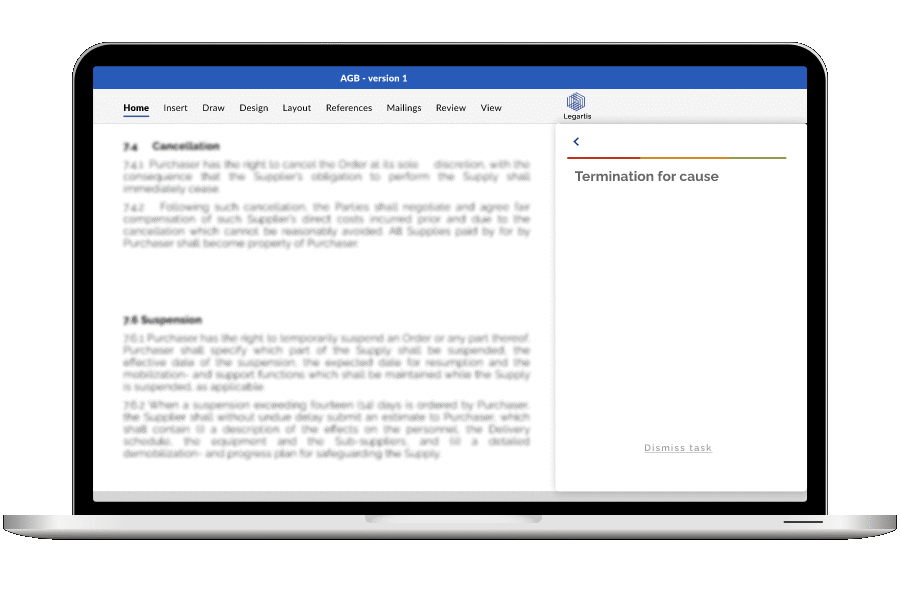Contract Analysis Software: An Introduction
Contract analysis software makes it possible to quickly and easily analyze contracts and extract important information. This helps to partially automate processes within the contract lifecycle, saving time and resources. But what exactly does contract analysis software do and how does it help your business?
Automation of contract processes
One of the possible functions of contract analysis software is the automation of contract processes. The software analyzes contracts and extracts important information to store in a contract lifecycle management (CLM) system, for example. In this way, contract analysis software accelerates sub-processes in contract management (saving relevant information from contracts) - because automation eliminates the need to manually type contract content into a CLM. This saves companies time and resources while improving data quality (reducing human typing errors) and ensures that contracts are managed efficiently.
Extraction of relevant contract content
Contract analysis software extracts relevant information from contracts. To do this, the software requires a Large Language Model (LLM) trained for a specific legal area. A trained LLM recognizes important legal terms (names, dates, contract terms, ...) within the contract clauses. This enables you to carry out further legal analytics. You can do this by the visualization of the recognized data in a clear dashboard to have the most important contract information immediately at hand. And this without having to go through hundreds of pages of text.
Analysis of contract content
Another important function of contract analysis software is the classification of contract content. The software classifies by analyzing contracts for specific contract topics. Today's large language models trained in contract content classification are able to identify and classify synonyms for certain terms. At Legartis, this type of classification is used to match contract topics with the company's own policies - allowing users to ensure that company policies are adhered to at all times. In addition, contract analysis with an AI (legal AI) speeds up contract review processes many times over.

Risk management
Another possible application is the analysis of risks arising from contracts. The software extracts contract content on contractual obligations and/or liability claims. In this way, risks arising from contracts become immediately visible. Companies are able to take measures to reduce risks.
Metadata analysis
Contract Analysis software is able to automatically recognize the metadata of contracts. In this way, details such as current contract status or associated departments are quickly captured and summarized for queries.
Compliance checks
AI enables automated querying of data at any time and allows its evaluation based on legal texts and playbooks. In this way, even after changes in the law, existing contracts are analyzed and their compliance queried in an accelerated manner.
Due Diligence
Due diligence involves a targeted search for documents with specific metadata and clauses. This becomes particularly relevant when regulatory changes occur, documents have to be disclosed to authorities, or mergers and acquisitions are planned.
Integration with other systems
Contract analysis software can also be integrated with other systems to further automate and streamline the contract management process. Be that CRM systems, accounting software or other business systems. Deeply integrated, this ensures a seamless contract process.
Why use contract analysis software?
There are numerous benefits to using contract analysis software for businesses. Among the most important are:
- Time savings
Manual review of contracts is very time-consuming. With contract analysis software, companies save time, are more productive, and speed up review processes. - Improved compliance
By automating contract analysis, companies ensure that they meet all regulatory requirements and that their contracts are legally compliant. - Risk mitigation
Contract analysis software helps identify potential risks in contracts by monitoring contract terms and deadlines. In this way, companies ensure that they do not overlook any important obligations. - Cost savings
By automating contract analysis (automated contract review), companies reduce the cost of reviewing contracts and use their resources more effectively. - Improved negotiating position
Contract analysis software strengthens the negotiating position of companies by helping to identify and avoid potential weaknesses in contracts.
Key Takeaways
Contract analysis software helps companies save time and money, improve compliance and risk management strategy, and strengthen their negotiating position. Repetitive work is eliminated, reducing sources of error from manual labor. This frees up legal staff to focus on value-added tasks. The focus shifts to processing business-relevant tasks. This increases productivity in companies as a whole and creates competitive advantages. And let's not forget: The use of technology attracts talent!
When looking for contract analysis software, it's important to choose a solution that meets your specific needs and offers a user-friendly interface. Compare the different options available and choose the one that best fits your needs.
How to use contract analysis software successfully: Read the interview with Dr. Marc Hansmann, Director Legal & Governance, Arvato Bertelsmann.

Recommended Articles
Trends 2025: AI in Contract Analysis
The latest trends in Large Language Models (LLMs) show a shift towards greater efficiency, advanced AI agents and wider adoption across all industries. AI models are becoming..
KPIs in Contract Review
KPIs (Key Performance Indicators) are indicators that are used to measure performance and determine whether specified targets are being achieved. This applies to companies,..
Legal AI Talk: Latest Large Language Model Trends
AI and Large Language Models (LLMs) are revolutionizing the legal industry, streamlining contract analysis, document automation, and research with greater precision...




